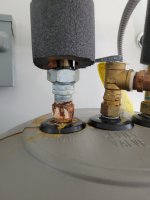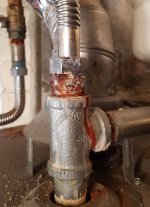- Joined
- Mar 8, 2009
- Messages
- 43,740
The pic shows what I found. This is a Rheem water heater, one of their forever tank models (bladder type). I installed about 2 years ago and at first there was a slight leak. Tightened it up and all good until now.
It looks wet but it's not. On top is a dielectric union and bottom is brass. It looks to me like galvanic corrosion and it's rusting bad. What ya'll think
It looks wet but it's not. On top is a dielectric union and bottom is brass. It looks to me like galvanic corrosion and it's rusting bad. What ya'll think





















